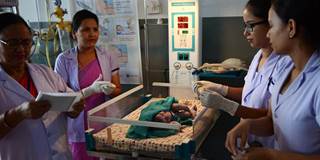Despite global improvements in health-care access, many governments in the Asia-Pacific region continue to overlook the importance of sexual and reproductive wellbeing. If the social and economic benefits of universal health coverage are to be realized, the needs of women and girls must become a high priority.
BANGKOK – Mai was 17 years old when she and her boyfriend became sexually active. Because unmarried adolescents in their country cannot access contraception without parental consent, they decided to make do without. Not long after, Mai became pregnant.
As a teen mother, Mai can access antenatal, obstetric, and post-natal care as part of her country’s public health system. But that system does not provide any coverage for contraceptives, and, without a full-time job, Mai cannot afford to pay for them herself. So, despite wanting to avoid or delay a possible second pregnancy, Mai once again has no choice but to go without any contraception.
Stories like Mai’s are all too common in the Asia-Pacific region, where access to comprehensive sexual and reproductive health services remains uneven. Despite significant progress in some countries toward achieving universal health coverage – a priority of the United Nations Sustainable Development Goals (SDGs) – a key component of women’s health is falling through the cracks. Until sexual and reproductive health services, including family planning, are offered more widely and fully covered under health financing schemes, efforts to provide health care to all who need it will continue to come up short.

BANGKOK – Mai was 17 years old when she and her boyfriend became sexually active. Because unmarried adolescents in their country cannot access contraception without parental consent, they decided to make do without. Not long after, Mai became pregnant.
As a teen mother, Mai can access antenatal, obstetric, and post-natal care as part of her country’s public health system. But that system does not provide any coverage for contraceptives, and, without a full-time job, Mai cannot afford to pay for them herself. So, despite wanting to avoid or delay a possible second pregnancy, Mai once again has no choice but to go without any contraception.
Stories like Mai’s are all too common in the Asia-Pacific region, where access to comprehensive sexual and reproductive health services remains uneven. Despite significant progress in some countries toward achieving universal health coverage – a priority of the United Nations Sustainable Development Goals (SDGs) – a key component of women’s health is falling through the cracks. Until sexual and reproductive health services, including family planning, are offered more widely and fully covered under health financing schemes, efforts to provide health care to all who need it will continue to come up short.